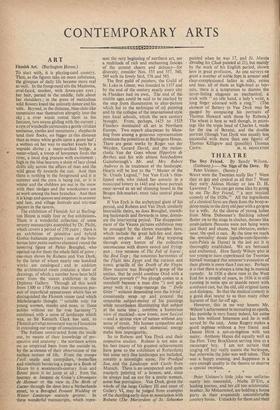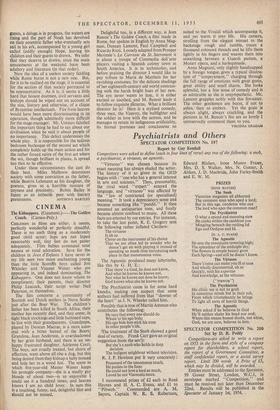THEATRE
the Boy Friend. By Sandy Wilson. (Embassy.)—No Sign of the Dove. By Peter Ustinov. (Savoy.) WHAT were the Twenties really like ? Were they as gay and cynical as all that ? Were they early Aldous Huxley or late D. H. Lawrence ? You can get some idea by going to see The Boy Friend, " a new musical comedy of the 1920s." All the ingredients of a classical form are there from the boop-a- doop music to the dirty old peer with a gorgon for a wife. As the chorus of young ladies. from Mme Dubonnet's finishing school flutter on to the stage in cloches, dresses like strait-jackets (bosoms were not being worn just then) and chaste, but obtrusive, under- wear, the spell is cast. By the time we reach the speciality. dance (apache-cum-Spanish- cum-Palais de Danse) in the last act it is thoroughly established. We are bemused 'and enchanted. How Sandy Wilson who is too young to have experienced the Twenties himself managed this sorcerer's evocation of their ghosts is more than I can say. Perhaps it is that there is always a time lag in musical comedy. In 1926 a show runs in the West End for a couple of years, in 1936 it is still running in some spa or seaside resort with a reduced cast, but the old, old original tunes and dialogue. So that the musical comedy is a good deal nearer to us than many other features of that far-off age.
However, this in no way lessens Mr. Wilson's achievement in recreating an epoch. His pastiche is very funny indeed, his satire has bite without bitterness and he is well served by the cast. Anne Rogers makes a good ingenue without a boy friend -and Denise Hirst a not-so-ingenue with too many. Anthony Hayes did equally well as the Hon. Tony Brockhurst serving time as a messenger boy. I am not certain that singing off key really assists the burlesque, but otherwise the joke was well taken. This was a happy evening, and happiness is a rare enough quality in the theatre to deserve a special mention.
*
Peter Ustinov's little joke was unfortu- nately less successful. Niobe D'Urt, a leading poetess, and her all too aristocratic brother, Sir Mohammed, are holding a house party in their exquisitely uncomfortable country house. Unluckily for them and their guests, a deluge is in progress, the waters are rising and the part of Noah has devolved on their eccentric father who eventually sets sail in his ark, accompanied by a young girl 'called (oddly enough) Hope, leaving his children and their guests to drown. We infer that they deserve to drown, since the main amusements at the weekend have been adultery and literature (in that order).
Now the idea of a useless society fiddling while Rome burns is not a new one. But, for it to be realised on the stage, it is essential for the section of that society portrayed to be representative. As it is, it seems a little hard that honest dustmen, civil servants and bishops should be wiped out on account of the sins, literary and otherwise, of a clique of Byzantine intellectuals. Fire from heaven would have been more discriminating in its operation, though admittedly more difficult for the stage-manager. Mr. Ustinov falsified the important thing he had to say about our civilisation when he said it about people of no importance. This defect undermines the whole play. It is responsible for the tedious bedroom burlesque of the second act which completely holds up the main action and for the rather forced satire of the first act where the wit, though brilliant in places, is spread too thin to be effective.
Under these circumstances the cast do their best. Miles Malleson denounces society with some conviction as the father, while Beatrix Lehmann as his daughter, the poetess, gives us a horrible mixture of coyness and preciosity. Robin Bailey is funny as an imbecile peer with literary



































 Previous page
Previous page